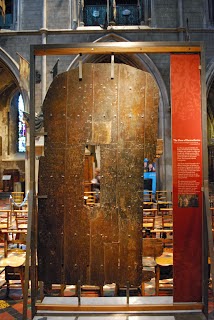"God was in Christ reconciling the world to Himself, not imputing their trespasses to them, and has committed to us the word of reconciliation." (2 Corinthians 5:19)
"Reconciliation" can be defined as follows: “Brought back together after being forced apart. Two beautiful pictures illustrate this truth:
First, God and man stood face to face with each other. Adam turned his back on God when he sinned, so God turned His back on Adam. Christ’s death satisfied the justice of God and God turned his face toward man again. It remains for man to turn and face God. God has been reconciled by the death of Jesus; now man is asked to be reconciled to God.

Second, consider the "Door of Reconciliation." This door is on display in St. Patrick’s Cathedral in Dublin, Ireland. Note the peculiar rectangular hole hacked out of its center. In 1492, while Columbus sailed the ocean blue (sorry, could not help myself) Sir James Butler, Earl of the Ormonds holed himself up in the Cathedral for protection during a feud against Sir Gerald Fitzgerald. After several weeks of waiting, Sir Gerald decided he wanted to end the feud so he went to the cathedral and requested entry, promising he would do no harm to Sir James. Sir James was suspicious, and refused him. Sir Gerald used a spear to hack through the wooden Cathedral door a hole just big enough to put his arm through. He then offered his hand as a gesture of peace. James shook his hand, the two were reconciled, and the feud ended. This is how we gained the term, “chancing one’s arm.”
Jesus said,
"I am the door; if anyone enters through Me, he will be saved, and will go in and out and find pasture.” [John 10:9]
This is what Jesus did, chancing both arms (as it were) when He died on the Cross paying the penalty for our sins. He “chanced his arm” to reconcile you to God. Do you refuse His offer of peace and remain His enemy, or will you be reconciled?

